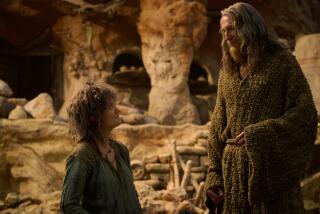Absolute Power Corrupts Absolutely
- Share via
“The Lord of the Rings: The Fellowship of the Ring,” which opens Wednesday, is a terrific movie about politics because it’s about power. And that’s what politics is all about: power--and the temptations that confront the powerful. Always. And there’s no real solution, at least not in the real world.
To be sure, the movie watcher must wade through three hours of mostly mumbo jumbo about hobbits and halflings, elves and orcs, and listen to dialogue such as, “I will bind myself to you, Aragon of the Dunedain. For you, I will forsake the immortal life of my people.” But the experience is rewarding because at the core of the film is the vast erudition and sharp moral vision of the British novelist J.R.R. Tolkien (1892-1973).
A medieval scholar by training, Tolkien settled into a comfortable life as an Oxford don in the 1920s, only to later live near some of the worst bombing of the 1940 blitz by the Nazis.
So while “The Hobbit,” published in the pre-World War II year of 1937, is comparatively light, the three sequels published in the post-war 1950s--”The Fellowship of the Ring,” “The Two Towers” and “Return of the King”--are darker in tone, preoccupied with the temptation of power and the corruption of the powerful.
Temptation, of course, is a common theme in the Western tradition, from Adam and Eve to Dr. Faustus. Yet the worst tempting in modern times has not been for the fruits of knowledge but rather for the red meat of power, as seen in the totalitarian regimes that haunted Tolkien’s life.
It’s fitting, then, that the author wrapped his quartet of novels around the Ring of Gyges.
According to a story cited in Plato’s work of political science, “The Republic,” written about 2,400 years ago, Gyges was a shepherd who found a gold ring. Putting it on, he discovered that it was magic, enabling him to become invisible.
Drunk with power, he traveled to the castle in the capital, seduced the queen and killed the king, all with impunity because he couldn’t be detected.
And so the question: If such absolute power existed, wouldn’t anyone, even a virtuous person, be tempted to wield such might for his own selfish purposes?
Plato answered by describing an ideal society in which people would want to do good for the sake of goodness.
But what if they were naughty, not nice?
Plato’s hypothetical Republic would be ruled by “guardians” who would oversee the right behavior. And there’s the historic rub: Who will guard the guardians?
In a democracy, of course, the answer is, “We all will.”
Tolkien, however, was writing in a time when fascists and communists, not democrats, seemed to be the wave of the future.
As governments grew ever bigger, the need to safeguard against the power of would-be guardians pushing “progress” was a deep concern to Tolkien, who idealized the simpler folkways of Old England.
And so he spun out his own stories, in which good and bad characters alike are tempted and twisted, like Gyges of yore, by lust for various magic rings.
Tolkien’s tales were challenging and disturbing because he presumed that nobody would be immune to such enticement.
The moral of Tolkien’s story is valid for the politics of today and every day: Trust no one with power, least of all yourself.
*
James P. Pinkerton writes a column for Newsday in New York. E-mail: [email protected].
More to Read
Only good movies
Get the Indie Focus newsletter, Mark Olsen's weekly guide to the world of cinema.
You may occasionally receive promotional content from the Los Angeles Times.










